Code 3 Thin Wingman Matrix Install Instructions
- Tipo
- Install Instructions

Page 1 of 8
Installation and Operation Instructions
Thin WingMan Series
MATRIX® Enabled
Weight: 5.2lbs
Input Voltage: 12-24 VDC
Input Current: 6.8 A max.
Output Power: 87.0 W max.
Fusing Requirement: 10A
Matrix® Connectivity: CAT5
Operating Temperature: -40ºC to 65ºC
(-40ºF to 149ºF)
Specications
IMPORTANT! Read all instructions before installing and using. Installer: This manual must be delivered to the end user.
WARNING!
Failure to install or use this product according to manufacturer’s recommendations may result in property damage, serious injury, and/
or death to those you are seeking to protect!
Do not install and/or operate this safety product unless you have read and understood the safety information
contained in this manual.
1. Proper installation combined with operator training in the use, care, and maintenance of emergency warning devices are essential to
ensure the safety of emergency personnel and the public.
2. Emergency warning devices often require high electrical voltages and/or currents. Exercise caution when working with live electrical
connections.
3. This product must be properly grounded. Inadequate grounding and/or shorting of electrical connections can cause high current arcing,
which can cause personal injury and/or severe vehicle damage, including re.
4. Proper placement and installation is vital to the performance of this warning device. Install this product so that output performance of
the system is maximized and the controls are placed within convenient reach of the operator so that they can operate the system without
losing eye contact with the roadway.
5. Do not install this product or route any wires in the deployment area of an air bag. Equipment mounted or located in an air bag
deployment area may reduce the eectiveness of the air bag or become a projectile that could cause serious personal injury or death.
Refer to the vehicle owner’s manual for the air bag deployment area. It is the responsibility of the user/operator to determine a suitable
mounting location ensuring the safety of all passengers inside the vehicle particularly avoiding areas of potential head impact.
6. It is the responsibility of the vehicle operator to ensure daily that all features of this product work correctly. In use, the vehicle operator
should ensure the projection of the warning signal is not blocked by vehicle components (i.e., open trunks or compartment doors),
people, vehicles or other obstructions.
7. The use of this or any other warning device does not ensure all drivers can or will observe or react to an emergency warning signal.
Never take the right-of-way for granted. It is the vehicle operator’s responsibility to be sure they can proceed safely before entering an
intersection, drive against trac, respond at a high rate of speed, or walk on or around trac lanes.
8. This equipment is intended for use by authorized personnel only. The user is responsible for understanding and obeying all laws
regarding emergency warning devices. Therefore, the user should check all applicable city, state, and federal laws and regulations. The
manufacturer assumes no liability for any loss resulting from the use of this warning device.

Page 2 of 8
Unpacking & Pre-Installation:
Carefully remove the product and place it on a at surface. Examine the unit for transit damage and locate all parts. If damage is found or
parts are missing, contact the transit company or Code 3. Do not use damaged or broken parts.
Ensure the product voltage is compatible with the planned installation.
Installation:
Thin WingMan vehicle specic mounting kits are available on our website. For information on how to mount the Thin WingMan using vehicle
specic kits, please refer to the installation instructions provided with those kits.
A universal mounting bracket (P/N: TWMTG-UNIV) is also available. See below for installation instructions.
The Universal kit includes (2) 90 Degree Universal Mounting Brackets. These brackets can be bolted to the Outer Panel of the Thin WingMan
and modied as needed to mount the unit. The Thin WingMan must be hard mounted to the sheet metal of the vehicle to prevent injury to
passengers in the event of a collision. It is the installers responsibility to ensure the product is mounted securely. Make sure proper support
is provided between the vehicle’s sheet metal and the ber/fabric of the package tray area as in many cases there is a substantial air gap
between them. In some cases you will need to self fabricate brackets to adapt the Thin WingMan to your vehicle.
Caution!!! When installing the unit do not push it too hard against the rear window. The unit only needs to just touch the glass
enough to fold the gasket ange back & block out as much ash back light as possible. A broken rear window can result if the unit
is installed too tight against the glass!
Installation and Mounting

Page 3 of 8
Wiring Instructions:
Connect the red (power) and black (ground) wires from the Matrix® enabled Thin WingMan to a nominal 12-24 VDC supply, along with a
customer supplied in-line, 10A slow blow ATC style fuse. Please note that the fuse holder selected by the customer must also be rated
by its manufacturer to meet or exceed the corresponding fuse ampacity. See Figure 1 for details.
The Matrix® enabled Thin WingMan must also connect back to a central node, such as the Serial Interface Box or Z3 Serial Siren, to
establish serial communication with the larger network. Please note, for CAT5 connections the PRI-1 port must always be utilized rst, before
additional devices can be connected to the SEC-2 port. See Figure 1 for details.
Figure 1
BLACK
10A
BLACK
10A
RED
RED Matrix® enabled
Thin Wingman
Matrix® enabled
Thin SuperVisor
CENTRAL NODE
PRI-1 SEC-2 B Y
IMPORTANT! This unit is a safety device and it must be connected to its own separate, fused power point to assure its continued operation
should any other electrical accessory fail.
Notes:
1. Larger wires and tight connections will provide longer service life for components. For high current wires it is highly recommended
that terminal blocks or soldered connections be used with shrink tubing to protect the connections. Do not use insulation displacement
connectors (e.g., 3M Scotchlock type connectors).
2. Route wiring using grommets and sealant when passing through compartment walls. Minimize the number of splices to reduce voltage
drop. All wiring should conform to the minimum wire size and other recommendations of the manufacturer and be protected from moving
parts and hot surfaces. Looms, grommets, cable ties, and similar installation hardware should be used to anchor and protect all wiring.
3. Fuses or circuit breakers should be located as close to the power takeo points as possible and properly sized to protect the wiring and
devices.
4. Particular attention should be paid to the location and method of making electrical connections and splices to protect these points from
corrosion and loss of conductivity.
5. Ground termination should only be made to substantial chassis components, preferably directly to the vehicle battery.
6. Circuit breakers are very sensitive to high temperatures and will “false trip” when mounted in hot environments or operated close to their
capacity.
CAUTION! Disconnect the battery before wiring up the
product, to prevent accidental shorting, arcing and/or
electrical shock.

Page 4 of 8
The Matrix® network is designed to accommodate a large number of accessory devices. However, Matrix® enabled Thin WingMan utilizing
CAT5 will always be the last device in either the PRI-1 or SEC-2 chain. Further instructions, features, and control options are detailed in the
installation manual of the customer selected “Central Node”.
The following table indicates the default ash patterns of the Matrix® enabled Thin WingMan. These patterns are activated by other
Matrix® compatible products, connected to the Matrix® enabled Thin WingMan. These can easily be recongured as desired, in the Matrix®
Congurator. See Matrix® Conguration Quick Start Manual for details.
Default Flash Patterns
Default Description
Dim 30%
Cruise Dim, Primary Steady
Level 3 Primary w/ Secondary Pops Triple Flash 150
Level 2 Primary Double Flash 115
Level 1 Primary Smooth Sweep
Brake Steady Red
Rear Cut
Left Arrow Tertiary Left Building Fast
Right Arrow Tertiary Right Building Fast
Center Out Tertiary Center Out Building Fast
Arrow Flash Tertiary Simultaneous Fast Flash
Red Blue Amber White Red Blue Amber
1 Single 75 CLASS 1 CLASS 1 CLASS 1 CLASS 1 CLASS B CLASS B CLASS B
2 Single 90-300 -
---- - - -
3 Single (ECE R65) 120 CLASS 1 CLASS 1 CLASS 1 CLASS 1 - - -
4 Single 150 CLASS 1 CLASS 1 CLASS 1 CLASS 1 - - -
5 Single 250 CLASS 1 CLASS 1 CLASS 1 CLASS 1 - - -
6 Single 375 CLASS 1 CLASS 1 CLASS 1 CLASS 1 - - -
7 Double 75 CLASS 1 CLASS 1 CLASS 1 CLASS 1 CLASS B CLASS B CLASS B
8 Double 85 CLASS 1 CLASS 1 CLASS 1 CLASS 1 - - -
9 Double (CA T13) 75 CLASS 1 CLASS 1 CLASS 1 CLASS 1 CLASS B CLASS B CLASS B
10 Double 90-300 -
---- - - -
11 Double 115 CLASS 1 CLASS 1 CLASS 1 CLASS 1 CLASS B CLASS B CLASS B
12 Double (CA T13) 115 CLASS 1 CLASS 1 CLASS 1 CLASS 1 CLASS B CLASS B CLASS B
13 Double (ECE R65) 120 CLASS 1 CLASS 1 CLASS 1 CLASS 1 - - -
14 Double 150 CLASS 1 CLASS 1 CLASS 1 CLASS 1 - - -
15 Triple 90-300 -
---- - - -
16 Triple 60 CLASS 1 CLASS 1 CLASS 1 CLASS 1 - - -
17 Triple 75 CLASS 1 CLASS 1 CLASS 1 CLASS 1 CLASS B CLASS B CLASS B
18 Triple Pop 75 CLASS 1 CLASS 1 CLASS 1 CLASS 1 CLASS B CLASS B CLASS B
19 Triple 55
---- - - -
20 Triple 115 CLASS 1 CLASS 1 CLASS 1 CLASS 1 CLASS B CLASS B CLASS B
21 Triple (ECE R65) 120 CLASS 1 CLASS 1 CLASS 1 CLASS 1 - - -
22 Triple 150 CLASS 1 CLASS 1 CLASS 1 CLASS 1 - - -
23 Triple Pop 150 CLASS 1 CLASS 1 CLASS 1 CLASS 1 - - -
24 Quad 75 CLASS 1 CLASS 1 CLASS 1 CLASS 1 CLASS B CLASS B CLASS B
25 Quad Pop 75 CLASS 1 CLASS 1 CLASS 1 CLASS 1 CLASS B CLASS B CLASS B
26 Quad 40
---- - - -
27 NFPA Quad 77 CLASS 1 CLASS 1 CLASS 1 CLASS 1 CLASS B CLASS B CLASS B
28 Quad 115 CLASS 1 CLASS 1 CLASS 1 CLASS 1 - - -
29 Quad 150 CLASS 1 CLASS 1 CLASS 1 CLASS 1 - - -
30 Quad Pop 150 CLASS 1 CLASS 1 CLASS 1 CLASS 1 - - -
31 Quint 75 CLASS 1 CLASS 1 CLASS 1 CLASS 1 - - -
32 Quint 150 CLASS 1 CLASS 1 CLASS 1 CLASS 1 - - -
33 Six 60 CLASS 1 CLASS 1 CLASS 1 CLASS 1 - - -
34 Six 80 CLASS 1 CLASS 1 CLASS 1 CLASS 1 - - -
No. Description FPM
SAE J595
Flash Pattern Compliance Chart - Dual Color
CA TITLE 13

Page 5 of 8
Red Blue Amber
Color 1&2
Amber
Color 3 White Red Blue
Amber
Color 1&2
Amber
Color 3
1 Single 75 CLASS 1 CLASS 1 CLASS 1 CLASS 1 CLASS 1 CLASS B CLASS B - CLASS B
2 Single 90-300 - - - - - - - - - -
3 Single (ECE R65) 120 CLASS 1 CLASS 1 CLASS 1 CLASS 1 CLASS 1 - - - -
4 Single 150 CLASS 1 CLASS 1 CLASS 1 CLASS 1 CLASS 1 - - - -
5 Single 250 CLASS 1 CLASS 1 CLASS 1 CLASS 1 CLASS 1 - - - -
6 Single 375 CLASS 1 CLASS 1 CLASS 1 CLASS 1 CLASS 1 - - - -
7 Double 75 CLASS 1 CLASS 1 CLASS 1 CLASS 1 CLASS 1 CLASS B CLASS B - CLASS B
8 Double 85 CLASS 1 CLASS 2 CLASS 2 CLASS 1 CLASS 1 - - - -
9 Double (CA T13) 75 CLASS 1 CLASS 1 CLASS 1 CLASS 1 CLASS 1 CLASS B CLASS B - CLASS B
10 Double 90-300 - - - - - - - - - -
11 Double 115 CLASS 1 CLASS 1 CLASS 1 CLASS 1 CLASS 1 CLASS B CLASS B - CLASS B
12 Double (CA T13) 115 CLASS 1 CLASS 1 CLASS 1 CLASS 1 CLASS 1 CLASS B CLASS B - CLASS B
13 Double (ECE R65) 120 CLASS 1 CLASS 1 CLASS 1 CLASS 1 CLASS 1 - - - -
14 Double 150 CLASS 1 CLASS 1 CLASS 1 CLASS 1 CLASS 1 - - - -
15 Triple 90-300 - - - - - - - - - -
16 Triple 60 CLASS 1 CLASS 1 CLASS 1 CLASS 1 CLASS 1 - - - -
17 Triple 75 CLASS 1 CLASS 1 CLASS 1 CLASS 1 CLASS 1 CLASS B CLASS B - CLASS B
18 Triple Pop 75 CLASS 1 CLASS 1 CLASS 1 CLASS 1 CLASS 1 CLASS B CLASS B - CLASS B
19 Triple 55 - - - - - - - - -
20 Triple 115 CLASS 1 CLASS 1 CLASS 1 CLASS 1 CLASS 1 CLASS B CLASS B - CLASS B
21 Triple (ECE R65) 120 CLASS 1 CLASS 1 CLASS 1 CLASS 1 CLASS 1 - - - -
22 Triple 150 CLASS 1 CLASS 1 CLASS 1 CLASS 1 CLASS 1 - - - -
23 Triple Pop 150 CLASS 1 CLASS 1 CLASS 1 CLASS 1 CLASS 1 - - - -
24 Quad 75 CLASS 1 CLASS 1 CLASS 1 CLASS 1 CLASS 1 CLASS B CLASS B - CLASS B
25 Quad Pop 75 CLASS 1 CLASS 1 CLASS 1 CLASS 1 CLASS 1 CLASS B CLASS B - CLASS B
26 Quad 40 - - - - - - - - -
27 NFPA Quad 77 CLASS 1 CLASS 1 CLASS 1 CLASS 1 CLASS 1 CLASS B CLASS B - CLASS B
28 Quad 115 CLASS 1 CLASS 1 CLASS 1 CLASS 1 CLASS 1 - - - -
29 Quad 150 CLASS 1 CLASS 1 CLASS 1 CLASS 1 CLASS 1 - - - -
30 Quad Pop 150 CLASS 1 CLASS 1 CLASS 1 CLASS 1 CLASS 1 - - - -
31 Quint 75 CLASS 1 CLASS 1 CLASS 1 CLASS 1 CLASS 1 - - - -
32 Quint 150 CLASS 1 CLASS 1 CLASS 1 CLASS 1 CLASS 1 - - - -
33 Six 60 CLASS 1 CLASS 1 CLASS 1 CLASS 1 CLASS 1 - - - -
34 Six 80 CLASS 1 CLASS 1 CLASS 1 CLASS 1 CLASS 1 - - - -
SAE J595
Flash Pattern Compliance Chart - Tri Color
CA TITLE 13
No. Description FPM

Page 6 of 8
All lightbars are thoroughly tested prior to shipment. However, should you encounter a problem during installation or during the life of the
product, follow the guide below for troubleshooting and repair information. If the problem cannot be rectied using the solutions given below,
additional information may be obtained from the manufacturer – contact details are at the end of this document.
Troubleshooting:
Problem Possible Cause(s) Comments / Response
No Power
Faulty wiring Ensure power and ground connections to the product are secured. Remove and reconnect the
red power wire to the vehicle battery.
Input Voltage
The product is equipped with an over voltage lockout circuit. During a sustained overvoltage
event, the controller inside will maintain communication with the rest of the Matrix® network,
but disable power out to the light modules. Look for the solid red V_FAULT LED. Ensure that
input voltage does not exceed the specied range for your particular model. When overvoltage
occurs, the input must temporarily drop ~1V below the maximum limit in order to resume normal
operation.
Blown fuse The product may have blown an upstream fuse. Check and replace fuse if necessary.
No Communication
Ignition input
An ignition wire input is rst required to bring the central node out of a sleep state. From that
point, the central node controls the status of all other Matrix® compatible devices, including the
Thin WingMan. If the device is active, you should see a ashing green STATUS LED on the
controller inside. See the installation manual of the customer selected central node for further
troubleshooting of the ignition input.
Connectivity
Ensure that the CAT5 cable is securely connected back to a central node. Ensure that any
other cables connecting Matrix® compatible accessory devices in a CAT5 daisy chain are fully
seated with positive lock. Remember that the PRI-1 jack at the central node must rst be used,
before the SEC-2 jack can be used.
Bad Light Module
No Response Verify that the harness connection is secure at the back of each module.
Short Circuit
If any one light module is shorted out, and the user attempts to activate a ash pattern, the
pattern will not operate. Instead, the controller inside the Thin WingMan will display a solid red
I_FAULT LED.
Description Part No.
Gaskets
Replace Thin WingMan Gasket CZ4103
Replacement Parts:

Page 7 of 8
Notes:

Page 8 of 8
Product Returns:
If a product must be returned for repair or replacement*, please contact our factory to obtain a Return Goods Authorization Number (RGA
number) before you ship the product to Code 3®, Inc. Write the RGA number clearly on the package near the mailing label. Be sure you use
sucient packing materials to avoid damage to the product being returned while in transit.
*Code 3®, Inc. reserves the right to repair or replace at its discretion. Code 3®, Inc. assumes no responsibility or liability for expenses incurred for the removal and /or reinstallation of products requiring
service and/or repair.; nor for the packaging, handling, and shipping: nor for the handling of products returned to sender after the service has been rendered.
Manufacturer Limited Warranty Policy:
Manufacturer warrants that on the date of purchase this product will conform to Manufacturer’s specications for this product (which are avail-
able from the Manufacturer upon request). This Limited Warranty extends for Sixty (60) months from the date of purchase.
DAMAGE TO PARTS OR PRODUCTS RESULTING FROM TAMPERING, ACCIDENT, ABUSE, MISUSE, NEGLIGENCE, UNAPPROVED MODIFICA-
TIONS, FIRE OR OTHER HAZARD; IMPROPER INSTALLATION OR OPERATION; OR NOT BEING MAINTAINED IN ACCORDANCE WITH THE
MAINTENANCE PROCEDURES SET FORTH IN MANUFACTURER’S INSTALLATION AND OPERATING INSTRUCTIONS VOIDS THIS LIMITED WAR-
RANTY.
Exclusion of Other Warranties:
MANUFACTURER MAKES NO OTHER WARRANTIES, EXPRESS OR IMPLIED. THE IMPLIED WARRANTIES FOR MERCHANTABILITY, QUALITY
OR FITNESS FOR A PARTICULAR PURPOSE, OR ARISING FROM A COURSE OF DEALING, USAGE OR TRADE PRACTICE ARE HEREBY EX-
CLUDED AND SHALL NOT APPLY TO THE PRODUCT AND ARE HEREBY DISCLAIMED, EXCEPT TO THE EXTENT PROHIBITED BY APPLICABLE
LAW. ORAL STATEMENTS OR REPRESENTATIONS ABOUT THE PRODUCT DO NOT CONSTITUTE WARRANTIES.
Remedies and Limitation of Liability:
MANUFACTURER’S SOLE LIABILITY AND BUYER’S EXCLUSIVE REMEDY IN CONTRACT, TORT (INCLUDING NEGLIGENCE), OR UNDER ANY
OTHER THEORY AGAINST MANUFACTURER REGARDING THE PRODUCT AND ITS USE SHALL BE, AT MANUFACTURER’S DISCRETION, THE
REPLACEMENT OR REPAIR OF THE PRODUCT, OR THE REFUND OF THE PURCHASE PRICE PAID BY BUYER FOR NON-CONFORMING PROD-
UCT. IN NO EVENT SHALL MANUFACTURER’S LIABILITY ARISING OUT OF THIS LIMITED WARRANTY OR ANY OTHER CLAIM RELATED TO
THE MANUFACTURER’S PRODUCTS EXCEED THE AMOUNT PAID FOR THE PRODUCT BY BUYER AT THE TIME OF THE ORIGINAL PURCHASE.
IN NO EVENT SHALL MANUFACTURER BE LIABLE FOR LOST PROFITS, THE COST OF SUBSTITUTE EQUIPMENT OR LABOR, PROPERTY
DAMAGE, OR OTHER SPECIAL, CONSEQUENTIAL, OR INCIDENTAL DAMAGES BASED UPON ANY CLAIM FOR BREACH OF CONTRACT, IM-
PROPER INSTALLATION, NEGLIGENCE, OR OTHER CLAIM, EVEN IF MANUFACTURER OR A MANUFACTURER’S REPRESENTATIVE HAS BEEN
ADVISED OF THE POSSIBILITY OF SUCH DAMAGES. MANUFACTURER SHALL HAVE NO FURTHER OBLIGATION OR LIABILITY WITH RESPECT
TO THE PRODUCT OR ITS SALE, OPERATION AND USE, AND MANUFACTURER NEITHER ASSUMES NOR AUTHORIZES THE ASSUMPTION OF
ANY OTHER OBLIGATION OR LIABILITY IN CONNECTION WITH SUCH PRODUCT.
This Limited Warranty denes specic legal rights. You may have other legal rights which vary from jurisdiction to jurisdiction. Some jurisdic-
tions do not allow the exclusion or limitation of incidental or consequential damages.
Warranty:
© 2020 Code 3, Inc. all rights reserved.
920-0823-00 Rev. D
An ECCO SAFETY GROUP™ Brand
ECCOSAFETYGROUP.com
10986 North Warson Road, St. Louis, MO 63114 USA
Technical Service USA (314) 996-2800
CODE3ESG.com

Página 1 de 6
Instrucciones de instalación y operación
Serie Thin Wingman
MATRIX® activado
¡IMPORTANTE! Lea todas las instrucciones antes de instalar y utilizar. Instalador: Este manual se debe entregar al usuario nal.
ADVERTENCIA
Si este producto no se instala o se utiliza de acuerdo con las recomendaciones del fabricante, esto podría tener como resultado daños
a la propiedad, lesiones graves o la muerte de las personas que se busca proteger.
No instale ni opere este producto de seguridad, a menos que haya leído y comprendido la información de
seguridad contenida en este manual.
1. La correcta instalación junto con la capacitación del operador respecto del uso, el cuidado y el mantenimiento de los dispositivos de
advertencia de emergencia son esenciales para garantizar la seguridad del personal de emergencia y del público.
2. Los dispositivos de advertencia de emergencia a menudo requieren altas tensiones o corrientes eléctricas. Tenga precaución cuando
trabaje con conexiones eléctricas con carga.
3. Este producto debe estar correctamente conectado a tierra. La conexión inadecuada a tierra o el cortocircuito de las conexiones
eléctricas pueden causar arcos con alta corriente, lo que puede causar lesiones físicas o daños graves en vehículos, incluido fuego.
4. La correcta ubicación e instalación son vitales para el rendimiento de este dispositivo de advertencia. Instale este producto de forma
que el rendimiento de producción del sistema se maximice y los controles estén situados a una distancia apropiada para el operador, de
modo que pueda operar el sistema sin perder contacto visual con el camino.
5. No instale este producto ni tienda los cables en el área de despliegue de una bolsa de aire. Los equipos instalados o montados en el
área de despliegue de una bolsa de aire pueden reducir su ecacia o convertirse en un proyectil que podría causar lesiones personales
graves o la muerte. Consulte el manual del propietario del vehículo para ver el área de despliegue de la bolsa de aire. Es responsabilidad
del operador/usuario determinar la ubicación idónea para el montaje que garantice la seguridad de todos los pasajeros en el interior del
vehículo. En particular, se deben evitar las áreas de posible impacto con la cabeza.
6. Es responsabilidad del operador del vehículo asegurarse diariamente de que todas las funciones de este producto funcionen
correctamente. Durante el uso, el operador del vehículo debe garantizar que los componentes de este (es decir, maleteros o puertas de
compartimientos abiertas), personas, vehículos u otras obstrucciones no bloqueen la proyección de la señal de advertencia.
7. El uso de este o cualquier otro dispositivo de advertencia no garantiza que todos los conductores puedan observar o reaccionar ante una
señal de advertencia de emergencia ni que lo hagan. Nunca tome el derecho de paso por sentado. Es responsabilidad del operador del
vehículo asegurarse de que pueda continuar de forma segura antes de entrar en una intersección, conducir contra el tráco, responder a
una alta velocidad, o caminar sobre los carriles de tráco o cerca de estos.
8. Este equipo está diseñado para que solamente el personal autorizado pueda utilizarlo. El usuario es responsable de entender y obedecer
todas las leyes relacionadas con los dispositivos de advertencia en emergencias. Por lo tanto, el usuario debe comprobar todas las leyes
y regulaciones de la ciudad, el estado y el país. El fabricante no asume ninguna responsabilidad por cualquier pérdida ocasionada por el
uso de este dispositivo de advertencia.
Peso: 5.2lbs
Voltaje de entrada: De 12 a 24 V CC
Corriente de entrada: 6,8 A máx.
Potencia de salida: 87,0 W máx.
Requisitos de fusión: 10 A
Conectividad Matrix®:CAT5
Temperatura de
funcionamiento:
de -40 °C a 65 °C
(entre –40 °F y 149 °F)
Especicaciones:

Página 2 de 6
Desembalaje y preinstalación:
Retire el producto con cuidado y colóquelo sobre una supercie plana. Examine la unidad en busca de daños que se hayan producido en
el transporte y localice todas las piezas. Si encuentra algún daño, o faltan piezas, comuníquese con la empresa de transporte o Code 3. No
utilice piezas dañadas o rotas.
Asegúrese de que el voltaje del producto sea compatible con la instalación planicada.
Instalación:
Los kits de montaje de Thin Wingman especícos para un vehículo se encuentran disponibles en nuestro sitio web. Para obtener
información sobre cómo montar Thin Wingman con kits especícos para un vehículo, consulte las instrucciones de instalación que se
proporcionan con dichos kits.
También se dispone de un soporte de montaje universal (n.º de pieza: TWMTG-UNIV). Consulte las instrucciones de instalación a
continuación.
El kit universal incluye (2) soportes de montaje universales de 90 grados. Estos soportes se pueden atornillar al panel exterior de Thin
WingMan y modicar según sea necesario para montar la unidad. Thin Wingman debe montarse en la lámina metálica del vehículo para
evitar lesiones a los pasajeros en caso de una colisión. Es responsabilidad de las personas que realizan la instalación asegurarse de que el
producto se monte de forma segura. Asegúrese de contar con el soporte adecuado entre la lámina metálica y la bra o estructura del área
de bandeja del paquete, ya que en muchos casos hay un espacio de aire importante entre ellos. En algunos casos, deberá fabricar soportes
para adaptar el dispositivo Thin Wingman a su vehículo.
Precaución Cuando instale la unidad, no la empuje demasiado contra la ventana trasera. La unidad solo debe tocar el vidrio lo
suciente como para plegar la brida de la junta hacia atrás y bloquear la mayor cantidad de destellos de contraluz posible. Si la
unidad está instalada demasiado apretada contra el vidrio, puede romperlo.
Instalación y montaje:

Página 3 de 6
Instrucciones de cableado:
Conecte los cables rojo (alimentación) y negro (tierra) de Thin WingMan compatible con Matrix® a una alimentación nominal de 12 a
24 V CC, junto con un fusible tipo ATC de 10 A de acción lenta suministrado por el cliente. Tenga en cuenta que el portafusibles
seleccionado por el cliente también debe estar clasicado por su fabricante para cumplir o superar la correspondiente corriente
máxima del fusible. Consulte la Figura 1 para obtener más detalles.
Thin WingMan compatible con Matrix® también debe conectarse a un nodo central, como la caja de interfaz serial o la sirena serie Z3,
para establecer una comunicación en serie con la red mayor. Tenga en cuenta que para las conexiones CAT5, el puerto PRI-1 siempre
debe utilizarse primero, antes de que se puedan conectar dispositivos adicionales al puerto SEC-2. Consulte la Figura 1 para obtener más
detalles.
Figura 1
BLACK
10A
BLACK
10A
RED
RED Matrix® enabled
Thin Wingman
Matrix® enabled
Thin SuperVisor
CENTRAL NODE
PRI-1 SEC-2 B Y
¡IMPORTANTE! Esta unidad es un dispositivo de seguridad y se debe conectar a su propia fuente de poder de fusibles separada para asegurar
su funcionamiento continuo si cualquier otro accesorio eléctrico falla.
Notas:
1. Los cables más largos y las conexiones bien ajustadas ofrecerán una mayor vida útil a los componentes. Para cables de alta corriente, se
recomienda usar bloques de terminales o conexiones soldadas cuando se intube por contracción para proteger las conexiones. No usa
conectores de por desplazamiento en aislamiento (p. ej., conectores tipo Scotchlock de 3M)
2. Enrute el cableado utilizando pasacables y sellante cuando atraviese las paredes del compartimiento. Minimice el número de empalmes
para reducir la caída de tensión. Las temperaturas ambiente altas (p. ej., debajo de la cajuela) reducirán signicativamente la capacidad
de transmisión de la corriente de cables, fusibles e interruptores. Todo el cableado debe estar en conformidad con el tamaño mínimo de
cable y otras recomendaciones del fabricante, además de estar protegido de las partes móviles y las supercies calientes. Deben usarse
mangueras, pasacables, amarres de cables y accesorios similares de instalación para anclar y proteger todo el cableado.
3. Los fusibles o interruptores deben ubicarse tan cerca de los puntos de toma de potencia como sea posible y deben ajustarse al tamaño
exacto para proteger el cableado y los dispositivos.
4. Se debe prestar atención especial a la ubicación y al método para hacer las conexiones eléctricas y empalmes para proteger estos puntos
de la corrosión y la pérdida de conductividad.
5. La puesta a tierra solo debe hacerse a componentes sustanciales del chasis, de preferencia directamente a la batería del vehículo.
6. Los interruptores son muy sensibles a altas temperaturas y “se desconectarán falsamente” cuando se monten en ambientes calientes o
se operen cerca de su capacidad.
PRECAUCIÓN!
Desconecte la batería antes de conectar el producto para
evitar cortocircuitos, arcos con alta corriente o descargas
eléctricas accidentales.

Página 4 de 6
La red Matrix® está diseñada para alojar un gran número de dispositivos accesorios. Sin embargo, un Thin WingMan compatible con
Matrix® que utilice CAT5 siempre será el último dispositivo en la cadena PRI-1 o SEC-2. En el manual de instalación del "nodo central"
seleccionado por el cliente se proporcionan instrucciones, así como información sobre sus funciones y opciones de control adicionales.
La siguiente tabla indica los patrones de destello predeterminados de Thin Wingman compatible con Matrix®. Estos patrones se activan
mediante otros productos compatibles con Matrix®, conectados a Thin WingMan compatible con Matrix®. Estos se pueden recongurar
fácilmente según se desee en Matrix® Congurator. Consulte el Manual de inicio rápido de la conguración de Matrix® para obtener más
información.
Patrones de destello predeterminados
Predeterminado Descripción
Atenuación 30 %
Crucero Atenuación, principal estable
Nivel 3 Principal con chispa secundaria triple destello 150
Nivel 2 Principal doble destello 115
Nivel 1 Principal con barrido suave
Freno Rojo jo
Corte trasero
Flecha izquierda Terciario izquierdo con aumento rápido
Flecha derecha Terciario derecho con aumento rápido
Del centro hacia afuera Terciario central externo con aumento rápido
Destello de echa Terciario de destello rápido simultáneo
Descripción N.° de pieza
Juntas
Reemplace la junta de Thin WingMan CZ4103
Piezas de repuesto:

Página 5 de 6
Todas las barras de luces se prueban a fondo antes de su envío. Sin embargo, si se produce un problema durante la instalación o durante la
vida útil del
producto, siga la guía que aparece a continuación para obtener información sobre la solución de problemas y la reparación. Si el problema
no se puede solucionar con las soluciones que se indican a continuación, puede obtener información adicional del fabricante; los datos de
contacto se encuentran al nal de este documento.
Solución de problemas:
Problema Posibles causas Comentarios o respuesta
No hay
alimentación de
corriente
Cableado
defectuoso
Asegúrese de que las conexiones de alimentación y tierra al producto estén jadas. Retire y
vuelva a conectar el cable de alimentación rojo a la batería del vehículo.
Voltaje de entrada
El producto está equipado con un circuito de bloqueo de sobrevoltaje. Durante un evento
de sobrevoltaje sostenido, el controlador interno mantendrá la comunicación con el resto
de la red Matrix®, pero desactivará la salida de alimentación a los módulos de luz. Busque
el LED V_FAULT rojo jo. Asegúrese de que el voltaje de entrada no exceda el rango
especicado para su modelo en particular. Cuando se produce sobrevoltaje, la entrada debe
bajar aproximadamente 1 V por debajo del límite máximo de forma temporal para reanudar el
funcionamiento normal.
Fusible fundido Es posible que el producto haya fundido un fusible anterior en el circuito. Revise y sustituya el
fusible si es necesario.
Sin comunicación
Entrada de
encendido
Primero se necesita una entrada de cable de encendido para que el nodo central salga de un
estado de reposo. Desde ese punto, el nodo central controla el estado de todos los demás
dispositivos compatibles con Matrix®, incluido Thin WingMan. Si el dispositivo está activo,
debería ver un LED de ESTADO verde parpadeante en el interior del controlador. Consulte
el manual de instalación del nodo central seleccionado por el cliente para obtener más
información sobre la solución de problemas de la entrada de encendido.
Conectividad
Asegúrese de que el cable CAT5 está conectado correctamente a un nodo central. Asegúrese
de que cualquier otro cable que conecte dispositivos accesorios compatibles con Matrix® en
una cadena margarita CAT5 esté completamente encajado con un bloqueo positivo. Recuerde
que primero debe utilizarse el conector PRI-1 del nodo central, antes de poder utilizar el
conector SEC-2.
Módulo de luces
defectuoso
Sin respuesta Verique que la conexión del mazo de cables esté bien jada en la parte trasera de cada
módulo.
Cortocircuito
Si se produce un cortocircuito en algún módulo de luces y el usuario intenta activar un patrón
de destello, el patrón no funcionará. En su lugar, el controlador del interior de Thin WingMan
mostrará un I_FAULT LED rojo jo.

Página 6 de 6
Devolución de productos:
Si se debe devolver un producto para su reparación o reemplazo*, comuníquese con nuestra fábrica para obtener un Número de autorización
de devolución de mercancías (número RGA) antes de enviar el producto a Code 3®, Inc. Escriba claramente el número RGA en el paquete cerca
de la etiqueta de envío. Asegúrese de utilizar sucientes materiales de embalaje para evitar que se dañe el producto durante el envío.
* Code 3®, Inc. se reserva el derecho a realizar reparaciones o reemplazar productos según su criterio. Code 3®, Inc. no asume responsabilidad alguna por los gastos efectuados para remover o reinstalar
los productos que requieren servicios o reparaciones, por el embalaje, la manipulación y el envío ni por la manipulación de los productos devueltos al remitente después de que se haya prestado el servicio.
Política de garantía limitada del fabricante:
El fabricante garantiza que, en la fecha de compra, este producto se ajustará a las especicaciones del fabricante para este producto
(disponible de parte del fabricante a petición). Esta garantía limitada se extiende por sesenta (60) meses desde la fecha de compra.
LOS DAÑOS A LAS PIEZAS O LOS PRODUCTOS DEBIDO A MANIPULACIÓN, ACCIDENTE, ABUSO, MAL USO, NEGLIGENCIA, MODIFICACIONES
NO APROBADAS, FUEGO U OTRO PELIGRO, INSTALACIÓN U OPERACIÓN INCORRECTAS, O NO REALIZAR EL MANTENIMIENTO SEGÚN
LOS PROCEDIMIENTOS DE MANTENIMIENTO INDICADOS EN LAS INSTRUCCIONES DE INSTALACIÓN Y OPERACIÓN DEL FABRICANTE
ANULARÁN ESTA GARANTÍA LIMITADA.
Exclusión de otras garantías:
EL FABRICANTE NO REALIZA OTRAS GARANTÍAS, ESCRITAS O IMPLÍCITAS. LAS GARANTÍAS IMPLÍCITAS PARA LA COMERCIALIZACIÓN,
CALIDAD O ADECUACIÓN CON UN PROPÓSITO ESPECÍFICO O QUE SURJAN DEL CURSO DE NEGOCIACIÓNES, USO O PRÁCTICA
COMERCIAL QUEDAN, POR LA PRESENTE, EXCLUIDAS Y NO SE APLICARÁN AL PRODUCTO, SALVO EN LA MEDIDA EN QUE ESTÉ
PROHIBIDO POR LA LEY VIGENTE. LAS DECLARACIONES O DESCRIPCIONES ORALES SOBRE EL PRODUCTO NO CORRESPONDEN A
GARANTÍAS.
Soluciones y limitación de responsabilidad:
LA RESPONSABILIDAD EXCLUSIVA DEL FABRICANTE Y EXCLUSIVO RECURSO DEL COMPRADOR EN EL CONTRATO, AGRAVIO (INCLUIDAS
NEGLIGENCIAS) O CUALQUIER OTRA TEORÍA CONTRA EL FABRICANTE SOBRE EL PRODUCTO Y SU USO SERÁ, BAJO EL CRITERIO DEL
FABRICANTE, EL REEMPLAZO O LA REPARACIÓN DEL PRODUCTO, O EL REEMBOLSO DEL PRECIO DE LA COMPRA PAGADO POR EL
COMPRADOR POR EL PRODUCTO QUE NO CUMPLA CON LOS REQUISITOS. EN NINGÚN CASO LA RESPONSABILIDAD DEL FABRICANTE
QUE SURGE DE ESTA GARANTÍA LIMITADA O DE OTRA DECLARACIÓN RELACIONADA CON LOS PRODUCTOS DEL FABRICANTE EXCEDE
LA CANTIDAD PAGADA POR EL COMPRADOR POR EL PRODUCTO EN LA COMPRA ORIGINAL. EN NINGÚN CASO EL FABRICANTE SERÁ
RESPONSABLE DE LA PÉRDIDA DE GANANCIAS, EL COSTO DEL EQUIPO DE REEMPLAZO O EL TRABAJO, DAÑO A LA PROPIEDAD U OTROS
DAÑOS ESPECIALES, DERIVADOS O INCIDENTALES BASADOS EN CUALQUIER RECLAMACIÓN POR INCUMPLIMIENTO DE CONTRATO,
INSTALACIÓN INADECUADA, NEGLIGENCIA U OTRA RECLAMACIÓN, INCLUSO SI AL FABRICANTE O EL REPRESENTANTE DE ESTE SE
LE HA INFORMADO DE LA POSIBILIDAD DE DICHOS DAÑOS. EL FABRICANTE NO TENDRÁ MAYOR OBLIGACIÓN O RESPONSABILIDAD
EN CUANTO AL PRODUCTO O SU VENTA, OPERACIÓN Y USO, Y EL FABRICANTE TAMPOCO ASUME NI AUTORIZA LA CONJETURA DE
CUALQUIER OTRA OBLIGACIÓN O RESPONSABILIDAD RELACIONADA CON TAL PRODUCTO.
Esta garantía limitada dene derechos legales especícos. Puede tener otros derechos legales que varían entre jurisdicciones. Algunas
jurisdicciones no permiten la exclusión o limitación de daños derivados o incidentales.
Garantía:
© 2020, Code 3, Inc. Todos los derechos reservados.
920-0823-00 Rev. D
An ECCO SAFETY GROUP™ Brand
ECCOSAFETYGROUP.com
10986 North Warson Road, St. Louis, MO 63114 USA
Sevicio Técnico USA (314) 996-2800
CODE3ESG.com
-
 1
1
-
 2
2
-
 3
3
-
 4
4
-
 5
5
-
 6
6
-
 7
7
-
 8
8
-
 9
9
-
 10
10
-
 11
11
-
 12
12
-
 13
13
-
 14
14
Code 3 Thin Wingman Matrix Install Instructions
- Tipo
- Install Instructions
en otros idiomas
- English: Code 3 Thin Wingman Matrix
Artículos relacionados
-
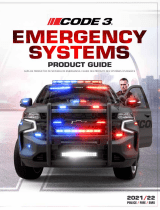 Code 3 Emergency Systems 2021 Guía del usuario
Code 3 Emergency Systems 2021 Guía del usuario
-
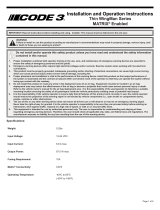 Code 3 Thin Wingman Install Instructions
Code 3 Thin Wingman Install Instructions
-
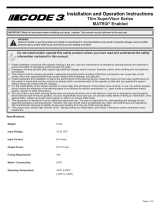 Code 3 Matrix Thin Supervisor Install Instructions
Code 3 Matrix Thin Supervisor Install Instructions
-
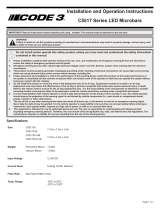 Code 3 C5517 Install Instructions
Code 3 C5517 Install Instructions
-
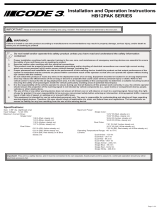 Code 3 HB12PAK Install Instructions
Code 3 HB12PAK Install Instructions
-
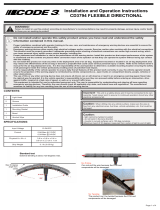 Code 3 CD3794 Install Instructions
Code 3 CD3794 Install Instructions
-
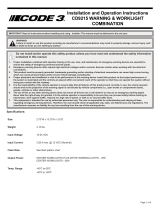 Code 3 CD9215 Series Install Instructions
Code 3 CD9215 Series Install Instructions
-
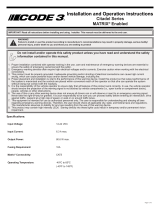 Code 3 Matrix Citadel Manual de usuario
Code 3 Matrix Citadel Manual de usuario





















